Iranian, French Presidents Discuss Vienna Talks In Phone Call
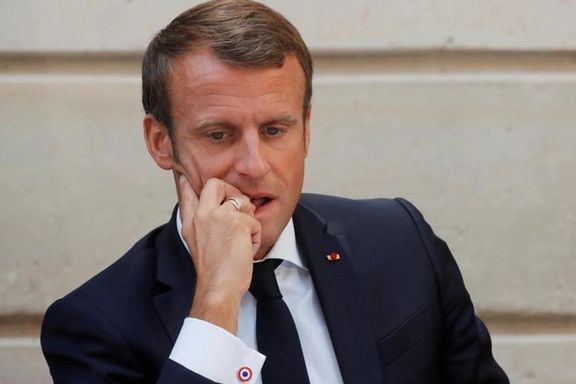
Iranian President Ebrahim Raisi and his French counterpart Emmanuel Macron have discussed ways to quicken the pace of Iran's nuclear talks in Vienna.

Iranian President Ebrahim Raisi and his French counterpart Emmanuel Macron have discussed ways to quicken the pace of Iran's nuclear talks in Vienna.
In a telephone conversation on Saturday, Raisi reiterated Tehran’s position that removal of sanctions, verification, and credible guarantees are the basic requirements for any deal in Vienna.
Raisi told Macron that "the Islamic Republic has already proven its resolve and seriousness for the realization of the agreement”, adding that any effort by the other side should incorporate Iran’s threefold demands.
Raeisi noted that the US itself has admitted that the former administration's decision to leave the 2015 deal and reimpose the so-called maximum pressure campaign had ended in failure.
During the phone call, Macron insisted that a deal is still possible if all parties give clear and sufficient commitments, stressing the need to accelerate the pace of the talk for achieving tangible progress.
The Élysée said Macron condemned Iran-backed Houthis' attack against the UAE, adding that he also expressed concern about the situation of jailed French national Benjamin Brière.
Macron also asked Raisi to immediately release 62-year-old anthropologist Fariba Adelkhah, who has been detained in Iran since 2019 on vague political charges.
The Iranian and French presidents also talked about the situation in Lebanon, where the influence of Iran-backed militant Hezbollah has sparked tensions in the sectarian country.

Voices calling for direct talks with the United States continue to be heard in Iran, as top officials recently signaled a shift in their hardline position.
Moderate conservative website Aftab News in Tehran called on Iranians not to scorn the country's officials for delaying direct negotiations with the United States now that they have indicated a policy shift to serve the country's interests.
Instead, the people should support the government for the right choice they have made by distancing themselves from irrelevant factional interests, the website wrote on Saturday, January 29.
The website was probably referring to Qom seminary clerics who called on Iran's Foreign Minister Hossein Amir-Abdollahian to backtrack from his declared position in support of direct talks, or to hardliner Kayhan's editor Hossein Shariatmadari who forced Security Chief Ali Shamkhani to repent and take back his statement in favor of direct negotiations.
Aftab News praised Amir-Abdollahian for softening his positions regarding nuclear talks aimed at reviving the 2015 agreement known as the JCPOA, mindless of the fact that such a shift would have not been possible if Supreme Leader Ali Khameneri had not signalled his agreement on January 9.
The website added that Iran can defend its interests in the international community while at the same time preserving its principles. The website called the shift in Iran's foreign policy "a reasonable shift." The article was probably part of the attempts to prepare public opinion in case a compromise with the West is made.
Gholamreza Nouri, an Iranian lawyer told Rouydad24 news website in Tehran that the time is over for Iranian politicians who in their speeches say they wish to punch this and that country in the mouth. "It is now in our interest to maintain direct contact with the world and interact with other countries,” he said
Expressing support for direct talks with the United States, Nouri criticized regime politicians who attack the current and former administrations for simply mentioning an interest in interaction with the world. He said in many of those who readily opposed direct talks with the United States have quickly shifted their position, but regardless of their motivation, “we should all be happy” to see that some of the opponents of interaction with America are now supporting the idea of direct talks with Washington.
During the past few days several lawmakers including members of the National Security and Foreign Policy Committee of the Majles have expressed support for direct talks with the United States.
Meanwhile, reformist activist Saeed Shariati told Roiuydad24 website that the public discussion about a dialogue between Iran and the United States has loosened the strong opposition of some regime supporters. He added that direct talks with America will add to President Ebrahim Raisi’s popularity, and even those who did not vote for him in the June 2021 election, will begin to support him.
Raisi was elected in the lowest presidential election turnout in Iran after key rivals were banned from running and has not solved any of the numerous crises facing the country.
According to Khabar Online, last week, following Iranian hardliners' vocal support for relying on Russia and China in Iran's foreign policy, some politicians and observers have come out arguing for a balanced foreign policy.
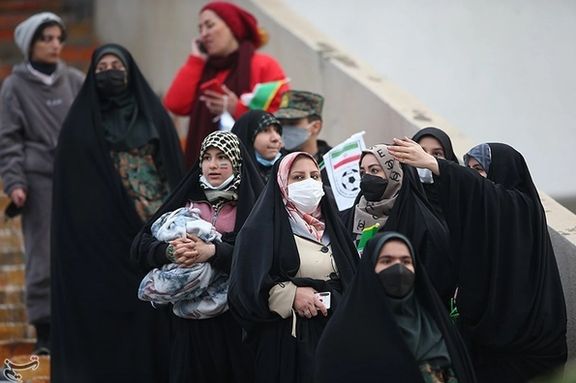
A tweet by US Special Envoy for Iran Robert Malley about the Islamic Republic allowing women into the stadium for a football match has drawn criticism by hundreds of Iranians.
Following the national soccer team’s victory against Iraq in a world cup qualifier, Malley congratulated the victory and said on twitterthat “It’s good to see women were allowed to attend the match”.
His post has angered Iranian social media users because he disregarded the fact that the government allowed only a small number of women into the stadium and many were cherry-picked by the authorities.
Malley also ignored the fact that Iran was forced by world soccer body FIFA to allow women into stadiums otherwise it would face global suspension or at least lose its hosting rights.
Many users called on Malley to stop supporting the Islamic Republic, with one political activist sayingthat Malley is either deceived by Iran’s propaganda or wants to deceive the world by echoing it.
Despite the FIFA order to allow women into stadiums without restriction and in numbers determined by demand for tickets, Iran reserved 2,000 seats for women, and they had to sit in segregated areas. There were also reports that a dozen female reporters and journalists were not allowed into the stadium.
Following repeated calls by hardliner politicians and media not to allow women to attend the next match, Iran has announced the Tuesday game against the UAE will have no spectators, mentioning Covid-19 as the reason.
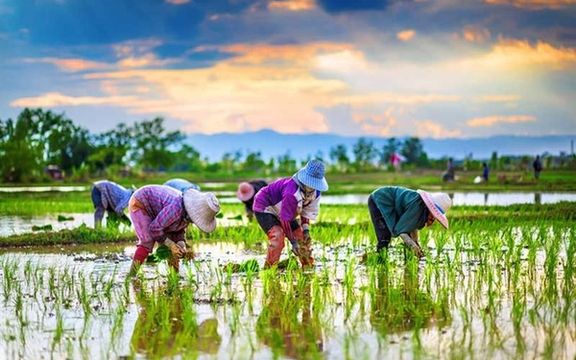
Iran's agriculture minister said Friday the Revolutionary Guards’ engineering arm Khatam ol-Anbia are to boost rice production with a $3 billion project.
According to the semi-official Mehr news agency, Javad Sadatinejad announced a five-year project, agreed by the ministry and Khatam ol-Anbia, that would be resourced through bartering oil.
The minister made the comments at a meeting in Roudsar, Gilan province, during a visit by President Ebrahim Raisi (Raeesi). "Initial agreements have been made and 7 trillion rials was allocated to this purpose during this visit," Sadatinejad said.
The IRGC is involved in many areas of the economy, including industrial and road construction, housing, and agriculture. In early January, the Minister of Energy Ali-Akbar Mehrabian said the ministry had concluded a 300-billion rial contract with the IRGC's Imam Hasan Headquarters for water projects in rural areas.
Sadatinejad said Iran imported around 1 million metric tons of rice annually but had the potential to be self-sufficient in line, he said, with the Raisi administration's top priorities.
Per capita rice consumption in Iran is around 35kg, putting overall consumption, including by agro-food industries, at 3.5 million tons. The highest output, achieved in 2018, was 1.9 million tons.
Major production is concentrated in the Caspian coastal provinces of Gilan, Mazandaran, and Golestan, which together produce over 75 percent of rice grown in Iran. Much of the terrain is mountainous or forested, leaving just a narrow strip for rice and other agriculture.
Other provinces including Esfahan, Khuzestan, and Fars produce rice on a small scale. Almost all these provinces have been hit by drought in the past few years and the ministry has banned rice cultivation in some provinces, including Golestan, which is among the provinces with the highest precipitation.
In 2013 the secretary of Iran's Rice Producers' Association, Jamil Alizadeh, said self-sufficiency in rice production was not logical given the crop requires intensive irrigation. Alizadeh said the country had 630,000 hectares of rice paddies but irrigation could be considered assured for only 520,000 with remaining crops vulnerable to drought.
Like much of the wider region, Iran has faced serious drought over two decades, with water shortages affecting around one-fourth of Iranian cities. Critics also blame water-intensive industries, and water stress had led to protests in affected areas, including the south-western province of Khuzestan and the central province of Esfahan since July this year, as communities vie for water supply.
In 2004 Iran announced self-sufficiency in wheat production, but four years later had to import over 5.4 million tons, which made it the world’s fourth-largest wheat importer. Imports continued until 2015, but since then the country imports only to maintain strategic food reserves.
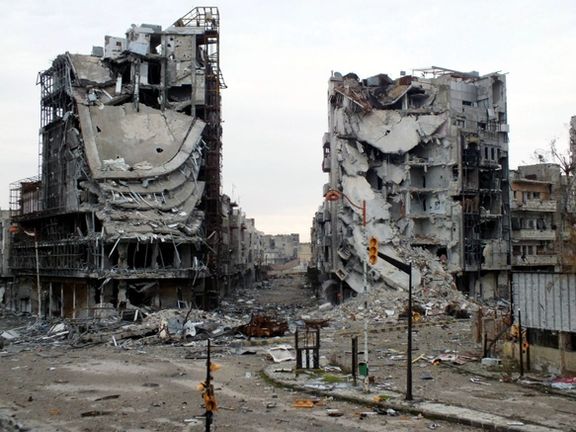
A member of parliament has said Iran is ready to build up to 500,000 residential units in Syria as part of that country’s reconstruction projects.
Mohammad-Reza Rezaee-Kuchi, who is the chairman of the Islamic Republic parliament’s construction committee said he was in Syria recently with a delegation of Iran’s ministry of roads and urban development to discuss how Iran could participate in the reconstruction of the war-ravaged country.
Two years ago, Iran signed an agreement with Syria to build 30,000 residential units, but a deputy minister later said the government could build 200,000 units.
Government officials had said earlier that Iran does not intend to pay for the projects but wants to secure a role for its companies in Syria’s construction. This would undoubtedly include the Revolutionary Guard construction arm, Khatam ol-Anbia, which has a dominating position in Iran due to its political clout.
Iran, which is suffering from a serious economic crisis, is unable to repair its own schools and complete public works. During mass protests in recent years disgruntled citizens have chanted slogans against involvement in Syria and elsewhere while many Iranians increasingly fall into poverty.
Hardliner president Ebrahim Raisi has promised to build 4 million apartments for low-income people during his term in office but so far, there is no sign of any construction.
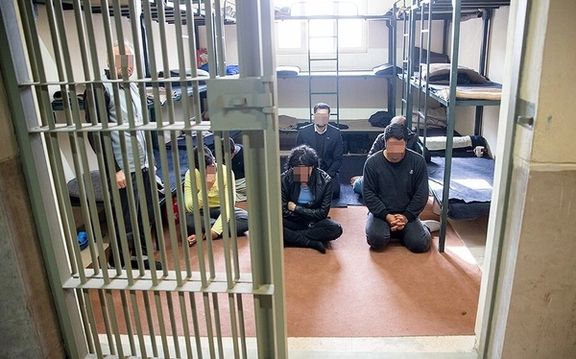
Guards and medical staff in a prison in Iran have attacked and beaten a number of political prisoners who had started a hunger strike.
Saeed Tamajidi, one of the prisoners who was arrested during 2019 popular protests also known as the Bloody November, broke the news in a Friday phone call from the Greater Tehran Central Penitentiary also known as Fashafuyeh.
He said several prisoners on hunger strike who were feeling sick were taken to the prison infirmary to register their vital signs but were insulted and threatened with a knife by one of the doctors there.
He added that following an argument, the doctor attacked him with a knife and medical staff and guards started beating him and others, injuring several of the prisoners.
Tamajidi said they were on a hunger strike to protest lack of proper care by the prison’s authorities and the death of Baktash Abtin a poet and a political prisoner.
Abtin died of Covid-19 complications following days of medically induced coma earlier in January after he was denied timely treatment by officials at Tehran’s notorious Evin prison.
A People's Tribunal organized by human rights advocates is slated to hold its next session in a few weeks to investigate the atrocities during the November 2019 protests, which were the bloodiest in Iran’s history with security forces opening fire on demonstrators in many cities, killing hundreds.